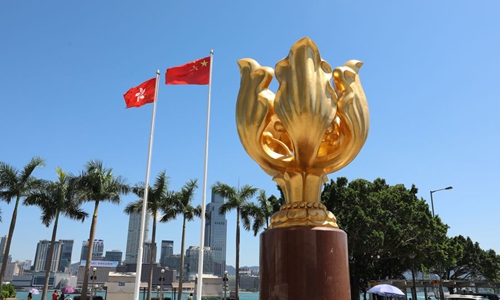HK removes controversial question from exam, citing reasons of respect for history
Source:Global Times Published: 2020/5/24 14:33:58 Last Updated: 2020/5/25 4:59:08
Question asking whether Japan’s invasion of China did more good than harm sparks criticism

Photo taken on Aug. 5, 2019 shows China's national flag and the flag of the Hong Kong Special Administrative Region on the Golden Bauhinia Square in Hong Kong, south China. Photo: Xinhua
Hong Kong education officials defended their decision to invalidate a controversial history exam question that asked students whether Japan's invasion of China did more good than harm, citing examination fairness and respect for history.
Hong Kong Secretary for Education Kevin Yeung Yun-hung told media on Saturday that a wrong question would not be fair to examinees, and it was also doubtful that examinees' answers to the question could be evaluated fairly.
The remarks came after the Hong Kong Examinations and Assessment Authority (HKEAA) announced Friday that it would invalidate an improper question that asked examinees whether they agree that Japan's invasion of China did more good than harm to China.
The improper question appeared on the history test paper of the Hong Kong Diploma of Secondary Education Examination on May 14, drawing a flood of criticism from education workers and experts who said that it was like asking Western students whether they thought Hitler did more good than harm to Europe.
HKAEE said they would give the examinees a score on the question based on their overall performance in the same paper. They would also remove the question from its question bank to prevent similar questions from appearing in the future.
Yeung said that the Hong Kong Education Bureau would further investigate the issue to clarify whether there was misconduct in the HKAEE's procedures or problems in their mechanism. The bureau would also consider how to enhance supervision responsibility over evaluation and exams in the long term.
Hong Chan Tsui Wah, Hong Kong Deputy Secretary for Education, told media Saturday that the invalidation of the question is also a result of respect for history and the public.
History classes are aimed at cultivating students' view of and respect for history. The history of Japan's invasion in China in 1900-45 is so heavy that people's feelings on it could not be ignored, Chan said.
"I have received an email from a veteran at his 90s who asked his grandson to write me an email, describing how he fought the Japanese invaders. Do you know how awkward the email makes me feel? This is people's real feeling on the issue," she said.
A draft decision on establishing and improving the legal system and enforcement mechanisms for Hong Kong to safeguard national security was submitted to China's top legislature on Friday, which means the work of formulating the national security legislation in the city would be accelerated.
Yeung said Saturday that the Hong Kong Education Bureau would properly consider measures to help students understand the clauses and meaning of the national security legislation after the related law is implemented in Hong Kong.
The city has revealed its flaws within its local education system. It has misguided history of the Opium War and Japan's invasion of China, which fostered students' incorrect historical and national viewpoints, Tian Feilong, an expert at Beihang University's Law School in Beijing, told the Global Times.
Hong Kong education authorities can use the new law as an opportunity to promote students' knowledge and identity with the country through national security education, according to Tian.
Posted in: SOCIETY